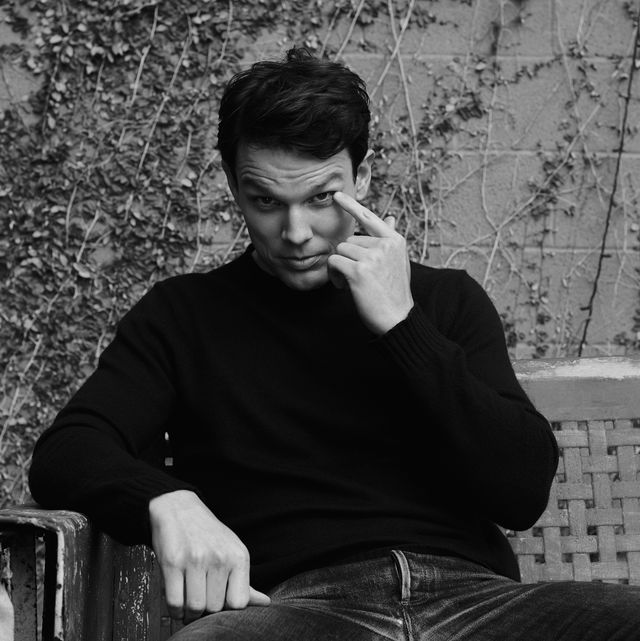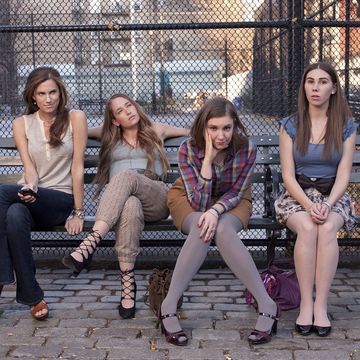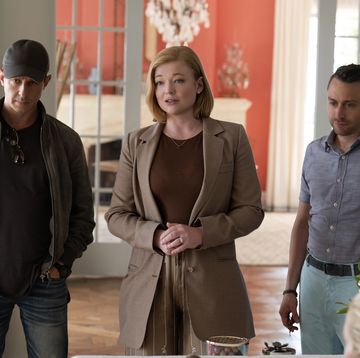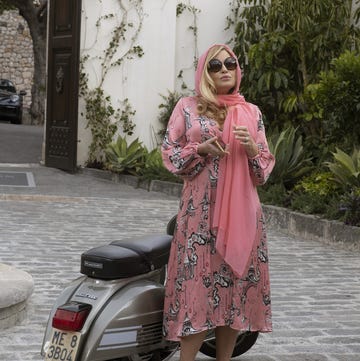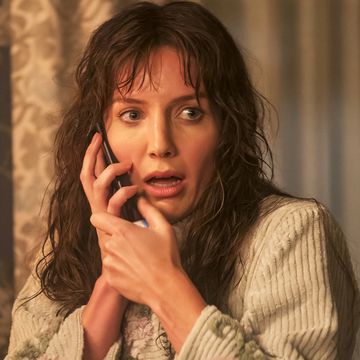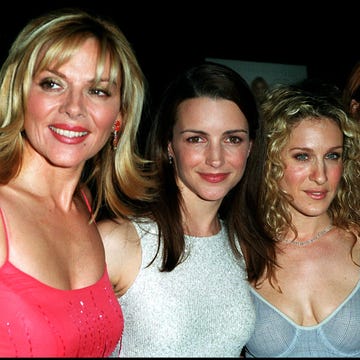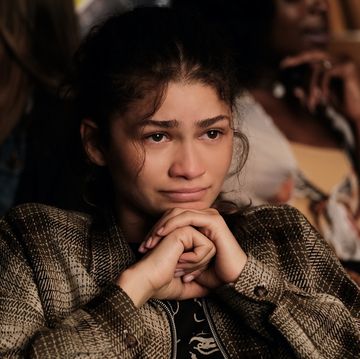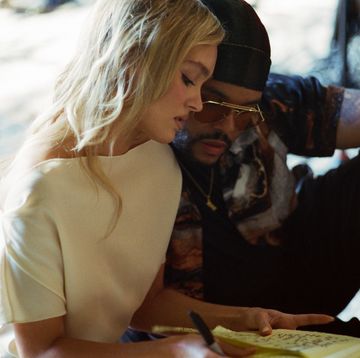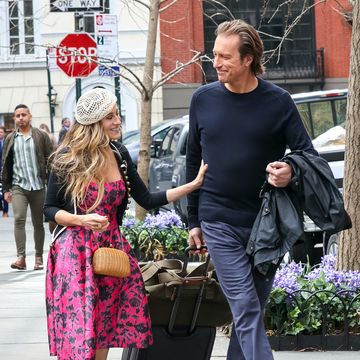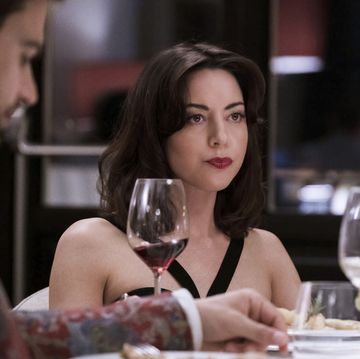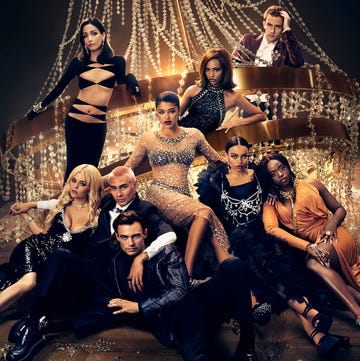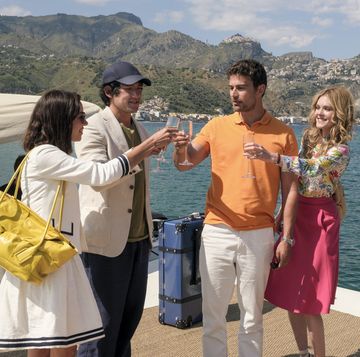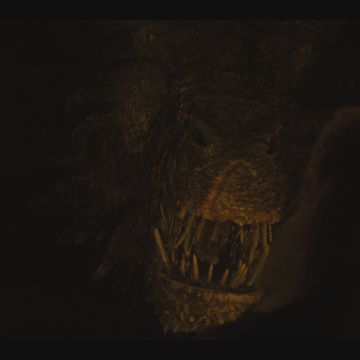Jake Lacy is usually hopeful to get cast in the projects he’s auditioning for, but when it came to The White Lotus, he wanted the role especially badly. There were a number of reasons: Mike White was showrunning; the role of Shane Patton, which he ultimately landed, “seemed awesome”; and he’d join a spectacular cast including Jennifer Coolidge, Connie Britton, Steve Zahn, Natasha Rothwell, and Molly Shannon. “Every once in a while you’re like, ‘Ooh, man, I hope that comes together for me.’ And this was certainly one of those,” Lacy says, while Zooming with BAZAAR.com from Portland, Oregon.
The new favorite HBO dramedy is a sharp, delicious satire that follows a group of wealthy vacationers at the titular luxury resort in Hawaii and the staff they wreak havoc on over the course of a week. (Imagine if The Bad Place was in the Four Seasons.) Lacy’s Shane arrives to honeymoon with his wife, Rachel (Alexandra Daddario). He’s rich, privileged, and a Cornell grad, if you couldn’t tell from his baseball cap. She’s a struggling journalist considering a career change, though her husband doesn’t understand. He’s too busy hounding the hotel manager because they didn’t get the honeymoon suite his mother booked for them. “He treats people terribly and is sure that he’s being treated terribly, but he’s like, ‘I paid for a room. You gave me the wrong room,’” Lacy explains forgivingly.
Shane is, one, a prick, but, two, a departure for Lacy, who’s grown a reputation for playing the nice guy, and playing him well. (You’ve probably already read that Vulture list by now.) “[It] was never like, ‘Hey let’s chase those roles.’ It just happened through a series [of parts],” says the actor, who’s charmed us in titles like The Office, Obvious Child, Girls, and High Fidelity. “A lot of the time, you get cast from a thing that somebody’s seen you in, and if you filled that role well in one place, then they are more inclined to think of you for a similar thing later down the line. Oftentimes, I get close and then don’t get cast as the ‘guy with the gun,’ because I’ve never been a guy with a gun. They hire a guy who—get this—has done roles where he has a gun.”
Part of the thrill of playing Shane was getting to drive his own narrative, unbearable as he may be. “It’s mostly about getting to have fun with the ownership of that story, as opposed to being in the passenger seat to a story. Which is what I’ve done in the past.” Lacy got a taste of handling his own, multilayered plot when he starred in Showtime’s I’m Dying Up Here, which ran from 2017 to 2018. His character, Nick Beverly, was “a survivor of childhood sexual abuse, he’s struggling with addiction, he’s a stand-up, he’s an unreliable friend, he’s loyal to other people—it’s a real mess of a story,” he recalls. It was also the first time the show creators and producers asked for his creative input for a role. “Getting to be along for that discussion really meant a lot.”
There was a similar kind of communication behind the scenes when it came to The White Lotus. “After speaking with Mike, I was like, ‘I get the impression that [Shane] is a guy who knows he can be an asshole and is really trying to not be an asshole,’” Lacy says of forming his paranoid character. But what excited him about the role—and the show as a whole—was how White wrote the characters to be equally likeable and unlikeable.
“There’s no good guy, bad guy,” Lacy says. “It’s just kind of a mess of what people think they need bumping up against other people who need other things. And that is much more what life is than a true, like, Voldemort kind of thing, you know? That has its place in storytelling, but [in] our day-to-day interactions, it’s much less a truly evil being and much more a person who wants something different from what we want, and we have to try to navigate that.”
Lacy self-taped his audition from his Brooklyn apartment, where he’s usually based, and did his callback over Zoom. While he, his wife, and their two kids spent the bulk of the pandemic last year with his family in Vermont, where he grew up, Lacy spent last November and December filming The White Lotus in Hawaii. There were heavy COVID-19 guidelines on set at the Four Seasons in Maui: After flying in, there was a 14-day quarantine; the cast was tested for COVID “every other day or four times a week,” Lacy says; there were rapid tests anytime there were intimacy scenes. They couldn’t leave the resort, where there were basically no guests and only limited staff. And, of course, people wore masks and face shields, and socially distanced on set.
Here, Lacy walks us through being part of our summer TV obsession, his take on Promising Young Woman, and what he learned from costar Jennifer Coolidge.
I feel like everybody knows Shane. He's the, "Can I speak to the manager?" guy, or the guy who calls his mom and dad if he faces a minor inconvenience, or somebody mansplaining on a date. How did you build the character? Did you look at specific people, or was there a kind of person you had in mind?
Mike had a lot in the script there, and thankfully, also as a director, [he] could offer up things that I had not arrived at. I would be looking at it at times unsympathetic to Shane, a little judgmental of what he's doing, and Mike was great at saying, "I think he should be more of this and more of that," to make him more affable, to make him more relaxed at times, which makes the rest of it so much more unpalatable. And when he is grotesque, you're like, "Oh, God," because, as you've just described, we know these different people in our lives.
Maybe that's five different people. And so to put all those things into one person is a lot. You go like, 'Well, I don't know if everyone is both low-key racist and mansplaining, but to sort of pepper those in, in a very casual way, is the most disconcerting part of it.' I really just looked at the script, and then followed Mike's lead and tried to selfishly just think about what Shane wanted out of this. And accepted that he's a person that is pretty shameless about that stuff, has never needed to sugarcoat anything, whether it's like, [if] he wants to have sex now, he wants to have sex now; [if] he wants to not go to the beach, he's not going to go. [He] just has lived a life of expectation and privilege to be like, 'I do what I want when I want. What is the problem?'
When we meet Shane and Rachel, they're freshly married, but you start to see cracks in the relationship and in their trust. Before they went on this trip, what was their relationship like? Why do you think they married each other?
I think that Shane had dated a lot of women through the years and sadly was like, "It's time to get married," and is with this woman who checks a lot of boxes for him. The boxes are pretty self-involved, like, "I think she's hot. I like to have sex with her. She's easygoing." There's not a lot of, "She has her own life, and her friends and my friends really get along." But also, that is his sense of what loving a person is. That's where it gets sensitive, in a way. He thinks this is love. And that at a certain point, you get married, and then you have a life with that person.
Maybe Alexandra [Daddario] alludes to or says it, but it is easy for them—for Shane to have this money and this life and to meet and hang out. … That's the sort of disconnect: Rachel is saying, "I'm concerned that that's all there is. And I would like more." And Shane is saying, "That is all there is, and what's wrong with that?"
I wonder if this role felt freeing and exciting for you considering—and I know this is something you're very aware of—everybody loves seeing you as a perfect boyfriend and the nice guy.
Yes is the answer. Also, I've been cast in those roles a lot and have been very fortunate to have a career in this business. But as a person, I just am not as laid-back and blindly supportive as the characters I've played. Shane gets obsessed about this room and about the way he's being treated. And I get obsessed about things as well, in a way that's like, "You need to cool out, Jake. Let it go, man." But the nice-guy boyfriend, he's happy to hang, he sees what she really means.
A lot of those roles where I'm a solid boyfriend are to exist in that story to complete somebody else's arc or to create discovery for them to be like, "Hey, maybe the stable thing isn't so bad. Maybe the stable, loving thing is better than the chaotic boyfriend who doesn't call you back and forgot your birthday. Maybe that's not that sexy."
But it also means that my story is pretty reactionary to somebody else's narrative. And then [as Shane], I get to drive this story, and it's me who's continually like, "I'm going to talk to the guy. I'm going to take care of this thing. I'm going to set up a boat trip for us." And it's my obsession with this thing that keeps making things worse and worse and worse. It's mostly about getting to have fun with the ownership of that story, as opposed to being in the passenger seat to a story. Which is what I've done in the past.
Watching Promising Young Woman last year opened up a conversation about nice guys and how they could be a) just walked on, or b) also manipulative and misogynistic. And I'm seeing your reaction now—what did you think when you watched it as somebody who had played those kinds of roles?
Well, I really wanted to be in that movie, and then couldn't because of scheduling. I was like, "It's all about nice guys! The role I was destined to play."
But really, I loved that. I loved the script. And then Emerald [Fennell], the director, and what they made is wonderful. ... I mean, it's even nerve-racking to talk about it, but essentially, I think unless you're one of the Chrises, the time for the white guy heroes, we're taking a pause on. And for the most part, guys who look like that or maybe act like that were into the Promising Young Woman territory, where you go like, "Let's explore what else might be going on there. And also other people's stories that are not just white men in their 30s."
I'm more than happy to be a part of that discussion, where you go, "Let's have this guy who seems like a nice dude, and then watch what happens when he's not so nice. Let's take the guy who seems like a right-down-the-middle, suburban whatever, and then see what else is happening." Not to the extent of Promising Young Woman, but a little bit with The White Lotus, Mike would be like, "Have [Shane] be more affable, just let it roll off your back," because all these people think that they're good guys. Everyone thinks they're a good guy. There's very few people who are like, "I'm awful. I'm just a terrible person. And I do bad things."
You talked about being in the running for "the guy with the gun"—is that still a type of role you'd be interested in? Do you want to go into action films? What kind of dream roles do you have, if any?
I, for a long time, equated getting to be in a Marvel movie or that world with success, that it was somehow a legitimizing, validating thing to be like, "You're worth this gamble that we'll put all this money behind you and you're the guy. You're good enough. You've made it." And I just don't feel that way anymore. You know, if somebody wanted to pay me all that money, I. would. do. it.
@Marvel, he’s not throwing the idea away.
You know, I'm not going to say no. But really, I'm not above that. I just would treat it now as any other opportunity. Whereas before, I had a lot of emotional eggs in that basket. 'Cause I would audition for some of that stuff and not get it and be just down on myself about it. This is a business, and it's a constant balance of being a part of things that are maybe creatively fulfilling—stories you want to be a part of, characters you want to play—and also being like, "I haven't worked in eight months, and I have to pay my rent and support my family." You know, if you're in that spot and somebody goes, "Do you want to do this really cut-and-dry 'good guy with a gun fights a bad guy with a gun' story?" You're like, "Yeah, if you want to pay me. Of course. Absolutely."
In my heart, though, I just want to be a part of stories and characters that I'm interested in that I think are engaging, whether that's good people or bad people or heroes or villains or somewhere in the middle. I love the Bourne movies—there's more happening there. There's a multidimensional world and universe and story and past and future that they're playing with, and that's amazing. I don't have a lot of interest in being, like, in The Expendables, do you know what I mean?
Marvel films used to be how you defined success, but how would you define it now?
Just doing the best work I can on anything I'm in. I'm not in a position to pick and choose projects, you know? There's times where I can say no, infrequently, but I'll get an offer for something and say, "I don't think that's for me," and very rarely get an audition for something that I'm like, "I don't want to even audition for that. I don't like what that is." But I'm not cutting my own path and being like, "I'll do this next! And I have these three movies booked!" Really, it's about wanting to be a part of good things, but that's more luck and opportunity than it is my decision making.
What was it like working with Jennifer Coolidge in The White Lotus? Was there anything about her performance that inspired you?
She, as a person, is intelligent and observant and funny and curious, and I just think the world of her, and then she plays in this arena of someone who, you don't know if they're coming or going. There's a very low-key tension in a person where you don't know what they're going to say next, because they're a sort of wild, ridiculous performer, or where they're muted and calm, but then whatever comes next can either be totally normal or totally ridiculous. The release of that thing is what's so fun.
Did you totally lose it at the ashes-spreading scene? Because I did.
Yeah, there was a fair bit of luck. If it broke, it was really hard for me to regroup and not keep losing it. And I can't remember now what it was that she was saying, but it was during the boat scene and she's doing this sort of eulogy for her mother to strangers, and Mike had written all this great stuff, and then he was like, "Also feel free to do your thing." And she just would riff on how cruel her mother was to her and she said something like, "My mother would always say I was too thin."
"My mother told me I could never be a ballerina, and that's when I was skinny."
Yes. But also then adding other things that didn't make it into the cut, where she's talking about, "She said I was too thin, and this is when she only weighed 45 pounds," things like that. There's probably 45 minutes of her saying things that didn't make it into the cut during this eulogy. Or, it's in the cut now, but she was yelling "mother" in a way that is both so desperate and needy, but isn't a proper scream. [Laughs.] It's like a person doing the idea of a yell, and then saying, like, "Mother!" into the water. That stuff that was not scripted. You could keep with it for so long, and then have to look away, because also you're like, "I don't want to ruin this."
The rest of the shoot, I think I kept it together, but that boat scene in particular, her eulogy was too much. She also invites us up to sit one time and she goes, "You're both so attractive." And you're like, "Oh, thanks." And she was like, "You look like toothpaste models," then just sort of stares and waits for you to say something. That, to me, is that power where she'll just leave something and let it hang there, and then wait for you to try to deal with it. It's such a wonderful move.
This interview has been edited for clarity.
Erica Gonzales is the Senior Culture Editor at ELLE.com, where she oversees coverage on TV, movies, music, books, and more. She was previously an editor at HarpersBAZAAR.com. There is a 75 percent chance she's listening to Lorde right now.
